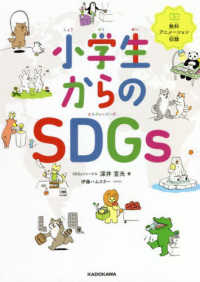- ホーム
- > 洋書
- > 英文書
- > Business / Economics
Full Description
One of the most urgent challenges in African economic development is to devise a strategy for improving statistical capacity. Reliable statistics, including estimates of economic growth rates and per-capita income, are basic to the operation of governments in developing countries and vital to nongovernmental organizations and other entities that provide financial aid to them. Rich countries and international financial institutions such as the World Bank allocate their development resources on the basis of such data. The paucity of accurate statistics is not merely a technical problem; it has a massive impact on the welfare of citizens in developing countries.
Where do these statistics originate? How accurate are they? Poor Numbers is the first analysis of the production and use of African economic development statistics. Morten Jerven's research shows how the statistical capacities of sub-Saharan African economies have fallen into disarray. The numbers substantially misstate the actual state of affairs. As a result, scarce resources are misapplied. Development policy does not deliver the benefits expected. Policymakers' attempts to improve the lot of the citizenry are frustrated. Donors have no accurate sense of the impact of the aid they supply. Jerven's findings from sub-Saharan Africa have far-reaching implications for aid and development policy. As Jerven notes, the current catchphrase in the development community is "evidence-based policy," and scholars are applying increasingly sophisticated econometric methods—but no statistical techniques can substitute for partial and unreliable data.
Contents
Introduction1. What Do We Know about Income and Growth in Africa?2. Measuring African Wealth and Progress3. Facts, Assumptions, and Controversy: Lessons from the Datasets4. Data for Development: Using and Improving African StatisticsConclusion: Development by NumbersAppendix A. A Comparison of GDP Estimates from the World Development Indicators Database and Country EstimatesAppendix B. Details of Interviews and QuestionnairesNotes
References
Index








